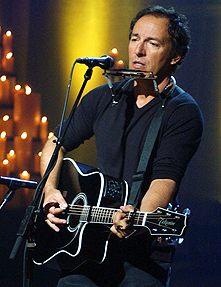Playlist: 5 songs that perfectly captured 9/11 even thought they were written before the attacks

Monday, Sept. 10, 2001, was the day I officially began my permanent post-college employment—my first day on the job not as an intern but as a full-fledged reporter for the (Port Huron, Michigan) Times Herald. The next day, I worked at least 13 hours, writing stories about panicked motorists lining up for gasoline and interviewing clergy about special services being planned. I was living all alone in a studio apartment in a small town where I didn’t know anyone. When I wasn’t on the phone with loved ones, I buried myself in music. Like a lot of people, music got me through that week.
What’s always impressed me about the songs I most associate with that horrendous day and its impossibly blue skies is how many of them were written before the attacks and yet somehow perfectly summed up the country’s grief-stricken mood. That’s probably not unusual. Perhaps momentous, historical tragedies always add new relevance to art that already had deep emotional currents to it.
At any rate, here’s my contribution to today’s anniversary remembrances, in playlist form:
“Jesus, Etc.,” Wilco (2002)
When Yankee Hotel Foxtrot came out seven months after the attacks, many commenters deemed it the definitive post-Sept. 11 album, with such song titles as “Ashes of American Flags” and even an image of twin towers on the cover. Of course, the towers are simply a striking landmark familiar to anyone who’s spent much time in downtown Chicago, and Yankee Hotel Foxtrot was actually completed in the summer of 2001. The only thing that kept if from being released until after 9/11 was the stunning example of record-label incompetence demonstrated by Warner Bros. in its rejection what would prove one of the most critically acclaimed albums of the decade. Even with this knowledge, however, I can’t help but associate “Jesus, Etc.” with the attacks, given lyrics that mention “tall buildings shake” and “skyscrapers are scraping together.”
“Not the Same,” Ben Folds (2001)
Jay-Z’s The Blueprint is undeniably the most famous album released on Sept. 11, 2001, but I was more interested in piano man Ben Folds’ solo debut, Rocking the Suburbs. I’d been planning to pick up a copy after work that day, but we all know how that turned out. It was about a week before I managed to find the time and motivation to drop by the record store, but the CD quickly became my soundtrack for that fall. “Not the Same” was inspired by a true story about a friend of Folds who became a born-again Christian after taking acid at a party, but the repeated refrain of “You were not the same after that” started running through my head whenever someone on TV started talking about how America would never be the same.
“My City of Ruins,” Bruce Springsteen (2000)
The “America: A Tribute to Heroes” benefit telethon was full of repurposed songs intended to pay tribute to New York City and the victims, but Bruce’s contribution seemed just a bit to perfect. I assumed The Boss had penned a heart-wrenching reaction in the 10 days since the attacks, but I soon discovered it had been written about his hometown of Asbury Park, New Jersey. The song just happens to be so universal that it truly can serve as a tribute to any city struggling with tragedy and decay, whether induced by terrorism or complex socio-economic forces. Springsteen eventually did pen an album’s worth of songs in reaction to the attacks, but he included “My City of Ruins” as The Rising’s closing track.
“How to Disappear Completely,” Radiohead (2000)
Chuck Klosterman devoted an entire chapter of his book “Killing Yourself to Live” to the idea that Kid A presciently painted a portrait of New York on 9/11. The British band’s left turn into icy electronica did somehow seem to tap into the mood of an era that hadn’t arrived yet. And Klosterman isn’t the only one that found the lyrics to “How to Disappear Completely”—and its eerie, Penderecki-inspired string arrangement— running through his head as he watched events unfold that September morning: “I’m not here. This isn’t happening.”
“Chichester Psalms,” Leonard Bernstein (1965)
I remember someone (maybe President Bush?) called for a moment of silence on the Friday night after the attacks. I got home, lit some candles and spent the appointed time in quiet meditation. It was my first real chance to reflect on my own thoughts as opposed to approaching everything from the perspective of a professional journalist. (Even we small-town reporters had spent the week engrossed in our work.) When it had passed, I started looking through my CDs to find the ideal piece of music to capture what I was feeling, something that could express sorrow but also optimism. I settled on Bernstein’s remarkable choral piece. The composer’s close association with New York City didn’t hurt, and the second movement—which juxtaposes a gorgeous setting of Pslam 23 against a furious men’s chorus demanding, “Why do the nations rage?”—seemed appropriate. Even better was the piece’s closing moments, in which the choir, in hushed tones, sings in Hebrew: “Behold how good and how pleasant it is for brethren to dwell together in unity.” I think I listened to that third movement at least five times in a row, and eventually convinced myself that everything would be OK.